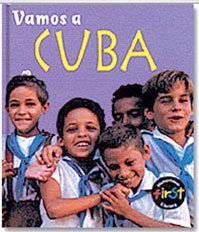
Various media on the Internet report that a Spanish-language children's book titled A Visit to Cuba has been removed from elementary school libraries by the Miami-Dade School Board in the US.
The board said the book is misleading because it portrays a happy lifestyle in Cuba. Some of the Cuban-American parents feel that after what they went through to leave the island, their children should be showed how difficult life can be there.
However, there are those who argue that the ban is unconstitutional, citing the First Amendment Act, which guarantees Americans freedom of speech.
What do you think?
www.child.com is running a poll asking people what they think. Like 12% of the respondents, I’m not sure what to think.
My challenge is that the issue is tackled from assumption that life in Cuba is extremely challenging. Frankly, I don’t know if the problems are unusually difficult, or if they are being exaggerated by the Americans and the Cuban-Americans.
The SA government is allies with the Cuban government, and the information that they communicate is that Cuba is doing well and SA could do well to learn from some of their initiatives.
Assuming that the Miami-Dade school board is right and life in Cuba is difficult, and let’s stretch it even say that the book was designed as a propaganda mechanism: does the school board have the right to remove a book that conflicts with their version of reality? Is that not in violation of the American’s First Amendment Act?
As at 15 July, 26% of respondents at www.child.com said they agree with the school board - the challenges of life under Communist rule should not be glossed over. 61% said removing the book violates the First Amendment.
Different truths
The issue has also made me consider the implications of the issue on writers in troubled countries.
As a South African writer, living contentedly here after apartheid, which vision of our country should I tell children?
Do I portray the version of reality that I and my children experience, where kids in my neighbourhood roller-blade up and down the street and walk to school and to the shops?
Do I tell the reality of a South African family now based in Canada having emigrated because the crime rate is high and this place is not safe for their children? Do I tell the story of the thousands of South African children who are raped and abused every year?
As a writer, I think all versions of reality should be heard. A story of ordinary South African life, where the greatest event is a trip to the circus, is no less valid than a story of a child who has been abused.
The latter may raise our awareness of the problems our society faces, and it may even make a better read, but it does not mean it is the only version that should be told.
2 comments:
I thin all versions should be told. The thing is US gov. in order to keep its political and economical power is trying to make us think that the only "right" way of living is through its consumption proposal.
Making believe that an Xbox is happiness they are only looking for how to perpetuate this mistaken ideas of happiness and others concerning to the wrong perception of self value which is based on how much we can buy and how many wealth can we accumulate
But I grew up in Mexico...and I was so happy and I am still so happy, and I wouldnt never chang my life for anything like the american life style. And I wish my kids to grow up the same way: dont want them to be slaves of fashion and things that doesnt has to do with our spiritual development.
What do I think?
I think freedom of speech is to shed light over and express all kind of different truths.
The happy succesful lifestyle of Finland shows one truth, although there do exist another unsuccesful truth at the same time. I believe it´s the same everywhere.
Artists, writers, photographers and media people do have a call to express different truths from their different viewingpoints.
Greetings Silja
Post a Comment